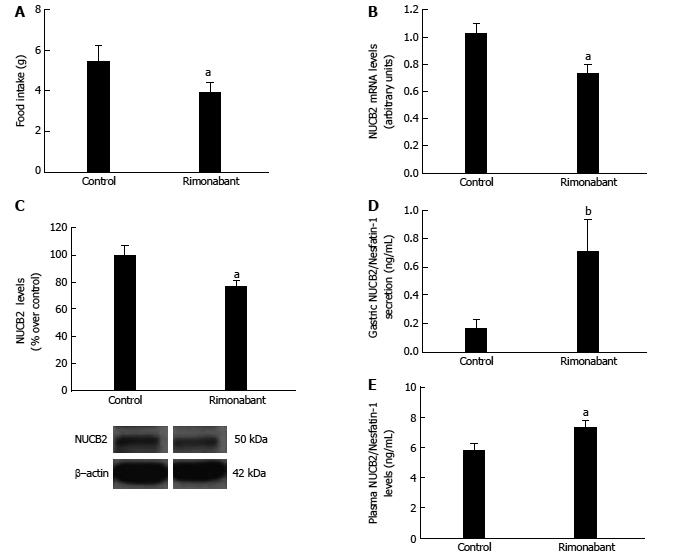Copyright
©The Author(s) 2017.
World J Gastroenterol. Sep 21, 2017; 23(35): 6403-6411
Published online Sep 21, 2017. doi: 10.3748/wjg.v23.i35.6403
Published online Sep 21, 2017. doi: 10.3748/wjg.v23.i35.6403
Figure 1 Effects of pharmacological blockade.
Food Intake (A), mRNA expression levels measured by real-time PCR for Nucb2 (B), Nucb2 protein levels and representative Western blot from the mucosa; β-actin was used as a loading control (C). Dividing lines indicate splicings within the same gel; D: Nucb2/Nesfatin-1 secretion from tissue explant analyzed by ELISA; E: Plasma Nucb2/Nesfatin-1 levels obtained from 36-h fasted animals that received i.p. treatment with Rimonabant (3 mg/kg i.p.) (n = 9) or vehicle (n = 9). aP < 0.05, bP < 0.01.
- Citation: Folgueira C, Barja-Fernandez S, Prado L, Al-Massadi O, Castelao C, Pena-Leon V, Gonzalez-Saenz P, Baltar J, Baamonde I, Leis R, Dieguez C, Pagotto U, Casanueva FF, Tovar SA, Nogueiras R, Seoane LM. Pharmacological inhibition of cannabinoid receptor 1 stimulates gastric release of nesfatin-1 via the mTOR pathway. World J Gastroenterol 2017; 23(35): 6403-6411
- URL: https://www.wjgnet.com/1007-9327/full/v23/i35/6403.htm
- DOI: https://dx.doi.org/10.3748/wjg.v23.i35.6403









